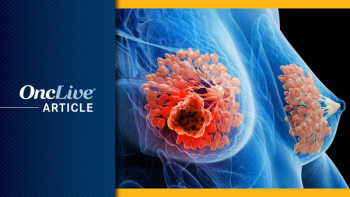
AC versus TaxAC in High-Risk HER2-Negative MBC
Transcript:Adam M. Brufsky, MD, PhD: But one last thing before we close because this is an important presentation for a lot of community oncologists, and that is the presentation of the B46 US Oncology TC (Taxotere plus cyclophosphamide) versus TAC (Taxotere, Adriamycin and cyclophosphamide) trial. Joyce, you want to summarize that for us before we end?
Joyce A. O’Shaughnessy, MD: Yes, the so-called ABC trial. It’s three iterations of a study done over time and it collectively analyzed six cycles of TC versus an ACT, or a TaxAC. It was either dose-dense ACT or AC followed by weekly paclitaxel or TAC, essentially in HER2-negative patients who were either node-positive or high-risk node-negative, stopped at the 344 events for the interim analysis because it did not hit the noninferiority boundary. In other words, it was inferior. The TC was inferior to the TaxAC. So, those are the overall result of the trial.
Looking at hormone-receptor status—nodal status subsets which were prospectively planned but were still subsets that were certainly underpowered with regard to statistical significance—you see the benefit really in the triple-negative patients; only 2%, 2.5% in the node-negative, triple-negatives in favor of anthracyclines, but increasingly large as you get up in your risk in triple negatives. And, in the ER-positives, the tumors with four or more positive nodes have a large benefit from anthracyclines. For the node-negative ER-positives, it goes in the other direction. There’s no benefit, at all, and in the 1 to 3 nodes group, it’s about 2%, 2.5%. So, frankly, these are data to the community to decide what they’re going to do with this. I think it’s the art of medicine once again, it’s not a one-size-fits-all situation. With triple negative, we’ll have to think very carefully about it. ER-positive, higher risk. And, in the 1 to 3 nodes positive, those with the probably highly proliferative disease, in my opinion, grade 3 are likely to be more genomically unstable. But, I think we’re all going to have to look at the data, and we’ll have to get it published quickly. It’s just an important data set for the community.
Adam M. Brufsky, MD, PhD: Is it going to change your practice?
Sunil Verma, MD, MSEd, FRCPC: No. I think it shows that there’s likely less need for chemotherapy in node-negative, ER-positive patients. Do we need to give chemotherapy or not? Of course, that’s on the genomic signatures. But if you’re going to give chemotherapy in node-negative disease, you probably don’t need to give anthracyclines. I think it justifies our clinical practice. The TC for node-negative ER-positive is a very reasonable option if you’re going to select chemotherapy. Outside of that, anthracyclines and taxanes remain the standard of care, and I think this confirms that.
Kimberly L. Blackwell, MD: I think it just reinforces what we were doing…
Adam M. Brufsky, MD, PhD: Right, what we already did.
Kimberly L. Blackwell, MD: Figure out the risk and then use more…
Adam M. Brufsky, MD, PhD: We, unfortunately, don’t have time to talk about that because I think there’s some incredibly important data about genomic risk, prospective data that was presented.
Transcript Edited for Clarity




































